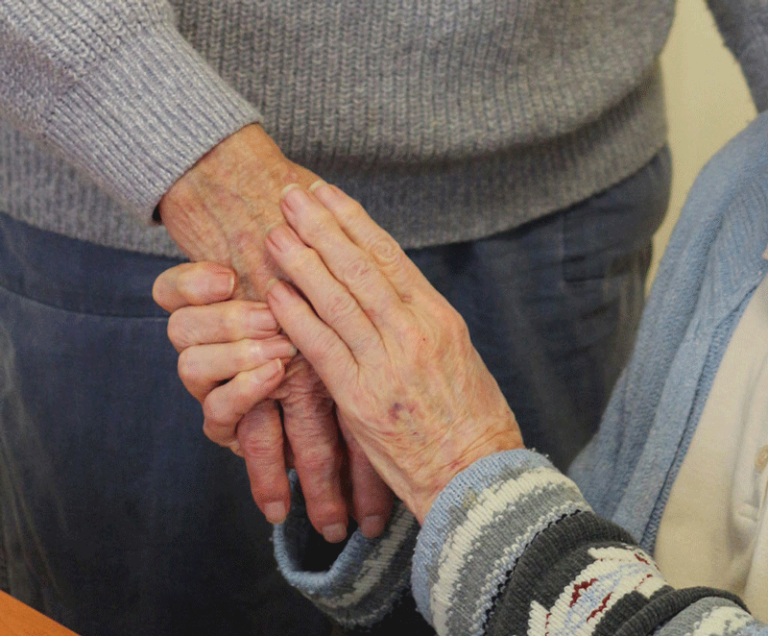What is frontal lobe dementia?
Learn more about frontal lobe dementia, a form of dementia that results from progressive damage to the frontal lobes.

Frontal lobe dementia, also known as frontotemporal dementia, is the name given to the form of dementia that results from progressive damage to the frontal lobes (behind your forehead) and/or temporal lobes (behind your ears) of the brain.
When damage occurs to the frontal or temporal lobes of the brain, memory usually remains unaffected, especially in the early stages, however other symptoms do occur.
According to Dementia Australia, there are three main types of frontal lobe dementia; behavioural variant, semantic dementia and progressive non-fluent aphasia.
Behavioural variant
Behavioural variant dementia is when damage occurs to the frontal lobes of the brain and causes changes to behaviour and personality. The frontal lobes, which are found behind the forehead, process information that affects how we behave and control our emotions. This region of the brain also helps us to plan, solve problems and focus for long periods of time.
Symptoms vary from person to person depending on which part of the frontal lobes are damaged. Common symptoms can include:
- Fixed mood and behaviour, appearing selfish or unable to adapt to new situations
- Loss of empathy and emotional warmth
- Lack of motivation, abandoning hobbies or avoiding social contact
- Difficulty in reasoning, judgement, organisation and planning
- Impulsiveness
- Changes in eating patterns
- A decline in self-care and personal hygiene

Semantic dementia
Semantic dementia is when damage occurs to the temporal lobes – the regions behind our ears – and results in a decline in language abilities.
People with semantic dementia experience impaired understanding of single words and difficulty remembering people’s names. Grammar and speech remain relatively intact, so speech still sounds fluent but may not always make sense, particularly as their ability to remember the meaning of words begins to decline.
Progressive non-fluent aphasia
Much like semantic dementia, progressive non-fluent aphasia is where damage occurs to the temporal lobes, but tends to have a later onset.
Most people with progressive non-fluent aphasia gradually lose the ability to speak fluently and have difficulty communicating due to slow production of words, distortion to speech and a tendency to say the wrong words. Spelling is also often impaired and some people develop difficulties reading, too.
In later stages, the disease can spread to the frontal lobes and behavioural changes can occur, particularly in emotional responses and empathy.
Who can get frontal lobe dementia?
Anyone can get frontal lobe dementia, however according to Alzheimer’s Association, it typically affects people at a younger age than Alzheimer’s disease. Symptoms – such as changes in personality and behaviour – often occur in people in their 50s or 60s, but can develop as early as their 20s or as late as their 80s.
Almost one third of people with the disease have a family history of dementia, however not everyone with a family history will develop a problem. There is still much research to be done to understand the causes and risk factors of frontal lobe dementia.

Does your loved one need support?
IRT has been supporting older Australians and their families with compassionate care for more than 50 years with aged care centres in NSW, Qld and the ACT. If your loved one needs warm and personalised care you can trust, we'd be more than happy to help.
Find out moreHow is it diagnosed?
General practitioners (GPs) or health professionals are unable to diagnose frontal lobe dementia with a single test alone. Instead, diagnosis usually requires a multifaceted approach to first rule out other conditions and diseases. Following this, GPs and health professional may recommend a series of tests to aid in diagnosis.
Alzheimer’s Association cites several tests that are commonly used to diagnose frontal lobe dementia. These include:
- Blood tests – to help identify other possible causes.
- Genetic testing – may be recommended to determine whether a person’s condition is caused by a specific gene.
- Neuropsychological testing – to check your judgement and memory skills, and help determine what type of dementia you may have.
- Brain imaging – to examine the brain and check for tumours or blood clots. If further tests are needed, more specialised brain scans will be carried out, such as a positron emission tomography (PET) or a single photon emission computerised tomography (SPECT) to measure the person’s brain activity.
- Magnetic Resonance Imaging (MRI) – to give GPs and health professionals a detailed image of your brain to assess any affected areas or damage.
- Computerised Tomography (CT) scan – which creates images of your brains in layers to enable a more thorough examination.
Find out more about the early signs of dementia
What treatments are available?
At this stage, there is no cure for frontal lobe dementia. Instead, treatment is aimed at managing and alleviating the symptoms associated with the disease.
Common treatments include:
- Medications – which are often used to treat behavioural symptoms associated with the disease and form part of a comprehensive treatment plan in consultation with a GP or health professional.
- Speech therapy – to help cope with a decline in language abilities. A speech therapist can also help you find alternative ways to communicate.
- Environmental changes – maintaining an environment that doesn’t agitate or upset someone is vital. People with behaviour problems are most comfortable in environments that are familiar, quiet, and away from large crowds.
Remember, only a medical practitioner such as a doctor or specialist can diagnose dementia. If an official diagnosis has been made, there is a lot of support available to help you and your loved ones manage. A good place to start is by visiting Dementia Australia’s website or by calling the National Dementia Helpline on 1800 100 500. They offer support, information, education and counselling.
Find out more about the early signs of dementia
You may also like
Choosing an Aged Care Centre: What to consider
Moving from your home into a residential aged care centre can be a rewarding experience for you or your loved one.
Downsizing your home for retirement: where to begin
Have you been thinking about downsizing your home? We help you make sense of this life-changing decision that can reap so many benefits as you…


